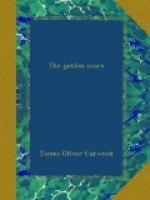Very soon he would pay the price of his stupidity—of his slowness to act. It was thought of that which quickened his pulse as he stared out into the white space into which Bram had gone. Before the night was over Bram would return, and with him would come the wolves.
With a shudder Philip thought of Corporal Lee as he turned back through the scrub to the big rock where he had made his camp.
The picture that flashed into his mind of the fate of the two men from Churchill added to the painful realization of his own immediate peril—a danger brought upon himself by an almost inconceivable stupidity. Philip was no more than the average human with good red blood in his veins. A certain amount of personal hazard held a fascination for him, but he had also the very great human desire to hold a fairly decent hand in any game of chance he entered. It was the oppressive conviction that he had no chance now that stunned him. For a few minutes he stood over the spot where his fire had been, a film of steam rising into his face, trying to adjust his mind to some sort of logical action. He was not afraid of Bram. He would quite cheerfully have gone out and fought open-handedly for his man, even though he had seen that Bram was a giant. This, much he told himself, as he fingered the breech of his rifle, and listened.
But it was not Bram who would fight. The wolves would come. He probably would not see Bram again. He would hear only his laugh, or his great voice urging on his pack, as Corporal Lee and the other man had heard it.
That Bram would not return for vengeance never for a moment entered his analysis of the situation. By firing after his man Philip had too clearly disclosed his identity and his business; and Bram, fighting for his own existence, would be a fool not to rid himself of an immediate and dangerous enemy.
And then, for the first time since he had returned from the edge of the Barren, Philip saw the man again as he had seen him standing under the white glow of the stars. And it struck him, all at once, that Bram had been unarmed. Comprehension of this fact, slow as it had been, worked a swift and sudden hope in him, and his eyes took in quickly the larger trees about him. From a tree he could fight the pack and kill them one by one. He had a rifle and a revolver, and plenty of ammunition. The advantage would lay all with him. But if he was treed, and Bram happened to have a rifle—
He put on the heavy coat he had thrown off near the fire, filled his pockets with loose ammunition, and hunted for the tree he wanted. He found it a hundred yards from his camp. It was a gnarled and wind-blown spruce six inches in diameter, standing in an open. In this open Philip knew that he could play havoc with the pack. On the other hand, if Bram possessed a rifle, the gamble was against him. Perched in the tree, silhouetted against the stars that made the night like day, he would be an easy victim. Bram could pick him off without showing himself. But it was his one chance, and he took it.




